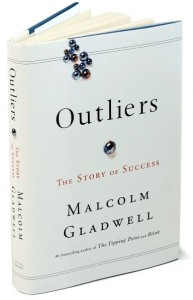 The Story of Success
The Story of Success
A lot of people recommended this book: Tam, Ron, Ralph and Signa, and even Rob listened to the audio version, so I picked up the book before I left on my travels. And so now I’m in the club… the book club, I guess.
This book had some really interesting ideas on why people are successful. It’s centered around the idea of opportunity, external factors, and work ethic. But disregards IQ, innate ability, and chance. At one point, the book even says creativity outweighs IQ in skill, and I’d have to agree. You don’t have to be the smartest in your class, just smart enough.
“Success is not a random act. It arises out of the predictable and powerful set of circumstances and opportunites” (p.155)
Here are some great points:
- A lot of hockey players are born after February. A lot of great baseball players are born after July. Why is this? Opportunity.
The cut off dates for Little League is the end of July and Pee Week Hockey is the end of January. While a six month age gap doesn’t seem much, it’s a huge difference in a child’s development. And people often mistake maturity for ability. So, the “older” kids, born within three months after the cutoff date, are competing against the younger kids and having more success. This leads to the older kids participating in playoffs, All Star games, more time on the field, and better confidence. So, the older kids have a better opportunity to succeed. - 10,000 hour rule.
“The emerging picture from such studies is that ten thousand hours of practice is required to achieve the level of mastery associated with being a world-class expert – in anything… No on has yet found a case in which true world-class expertise was accomplished in less time.” (p.41). Gladwell then uses examples of Bill Gates and the Beatles to prove his point. - Education – Summer breaks are bad. Kids lose much more during these breaks than is worthwhile. And it really shows in poor families vs. family who are well off. During the summer, the poorer children are not challenged in the summer. They sit in front of the TV and lose a lot of what they gained through the school year. Meanwhile, well-off children are going to camp, their parents are teaching them, etc. They can keep building on what they learned, rather then remembering. Wealthy kids are not smarter; just challenged more.
- Parenting: Challenge your kids. Don’t be over protective. Let children try to ask question to their doctors or negotiate with authority. Build their independence from you as a parent and for themselves. This will help them develop skills later in life.
- Nightly Question: Related to the Chet Holmes book I just read. Ask yourself a question each night and get the answer in the morning. Your mind is left to focus.
- Be individual. Do things to gain confidence. Assert yourself.
“Don’t depend on heaven for food, but on your own two hands for carrying the load” - Face the challenge and conquer it.
- “Success is a function of persistence and doggedness and the willingness to work hard… to make sense of something that most people would give up after thirty seconds.” P.245)
In the face of a challenge, keep pushing through to find the answer. Don’t give up. Shows weakness. Keep experimenting so you can grow.
Bottom line. You must have an exceptional opportunity to develop your skill. Your circumstance must also be aligned – era and demographic. Bill Gates is a nobody if he was born twenty years prior. And once the stars aligned, you must have the drive to put in the needed 10,000 hours.
“If you work hard enough and assert yourself, and use your mind and imagination, you can shape the world to your desires.” (p.151)
